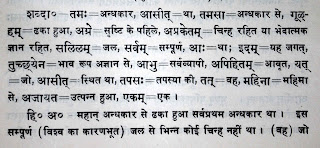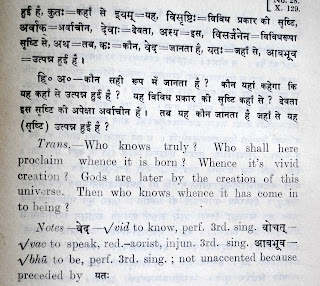"The Song of Creation" hymns called as in Rig-veda,
is a piece of marvelous thought of such an earlier age of known human civilization:
almost a theory of creation has been put forward in the distinctive Vedic style
of raising deeper questions
and then putting possible answer to that;
which clearly states that the emergence of all stellar and life forms
must have followed a sequence that could be seen
in following seven verses:
which runs very much parallel to-date's
scientific theories/hypothesis of creation and origin of some primordial life forms in water,
before the advent of God any ..
The Creation Hymn of Rig Veda
(Rig Veda Book 10 Hymn 129)
*
Then there was not non-existent nor existent:
there was no realm of air, no sky beyond it.
there was no realm of air, no sky beyond it.
What covered in, and where? and what gave shelter?
was water there , unfathomed depth of water?
**
Death was not then, nor was there aught immortal:
no sign was there, the day's and night's divider.
That one thing, breathless, breathed by it's own nature:
apart from it was nothing whatsoever.
no sign was there, the day's and night's divider.
That one thing, breathless, breathed by it's own nature:
apart from it was nothing whatsoever.
***
Darkness there was: at first concealed in darkness,
this all was undiscriminated chaos.
All that existed then was void and formless:
by the great power of warmth was born that unit.
this all was undiscriminated chaos.
All that existed then was void and formless:
by the great power of warmth was born that unit.
****
Thereafter rose desire in the beginning, desire the primal seed and germ of spirit.
Sages who searched with their heart's thought discovered the existent's kinship in the non-existent.
Sages who searched with their heart's thought discovered the existent's kinship in the non-existent.
*****
Transversely was their severing line extended:
what was above it then, and what below it?
There was begetters, there was mighty forces, free action here and energy of yonder.
what was above it then, and what below it?
There was begetters, there was mighty forces, free action here and energy of yonder.
Who verily knows and who can here declare it, whence it was born and whence comes this creation?
The gods are later than this world's production.
Who knows, then, whence it first came into being.
*******
The gods are later than this world's production.
Who knows, then, whence it first came into being.
*******
He, the first origin of this creation,
whether he formed it all or did not form it.
Whose eye controls this world in highest heaven,
he verily knows it, or perhaps he knows it not.
('Hindu Scriptures.' Everyman's Library. Dent, London.)
#For those interested in the original text:
nāsadāsīn no sadāsīt tadānīṃ nāsīd rajo no vyomāparo yat |
kimāvarīvaḥ kuha kasya śarmannambhaḥ kimāsīd ghahanaṃ ghabhīram ||
na mṛtyurāsīdamṛtaṃ na tarhi na rātryā ahna āsītpraketaḥ |
ānīdavātaṃ svadhayā tadekaṃ tasmāddhānyan na paraḥ kiṃ canāsa ||
tama āsīt tamasā ghūḷamaghre.apraketaṃ salilaṃ sarvamāidam |
tuchyenābhvapihitaṃ yadāsīt tapasastanmahinājāyataikam ||
kāmastadaghre samavartatādhi manaso retaḥ prathamaṃ yadāsīt |
sato bandhumasati niravindan hṛdi pratīṣyākavayo manīṣā ||
tiraścīno vitato raśmireṣāmadhaḥ svidāsī.a.a.at |
retodhāāsan mahimāna āsan svadhā avastāt prayatiḥ parastāt ||
ko addhā veda ka iha pra vocat kuta ājātā kuta iyaṃvisṛṣṭiḥ |
arvāgh devā asya visarjanenāthā ko veda yataābabhūva ||
iyaṃ visṛṣṭiryata ābabhūva yadi vā dadhe yadi vā na |
yo asyādhyakṣaḥ parame vyoman so aṅgha veda yadi vā naveda ||
kimāvarīvaḥ kuha kasya śarmannambhaḥ kimāsīd ghahanaṃ ghabhīram ||
na mṛtyurāsīdamṛtaṃ na tarhi na rātryā ahna āsītpraketaḥ |
ānīdavātaṃ svadhayā tadekaṃ tasmāddhānyan na paraḥ kiṃ canāsa ||
tama āsīt tamasā ghūḷamaghre.apraketaṃ salilaṃ sarvamāidam |
tuchyenābhvapihitaṃ yadāsīt tapasastanmahinājāyataikam ||
kāmastadaghre samavartatādhi manaso retaḥ prathamaṃ yadāsīt |
sato bandhumasati niravindan hṛdi pratīṣyākavayo manīṣā ||
tiraścīno vitato raśmireṣāmadhaḥ svidāsī.a.a.at |
retodhāāsan mahimāna āsan svadhā avastāt prayatiḥ parastāt ||
ko addhā veda ka iha pra vocat kuta ājātā kuta iyaṃvisṛṣṭiḥ |
arvāgh devā asya visarjanenāthā ko veda yataābabhūva ||
iyaṃ visṛṣṭiryata ābabhūva yadi vā dadhe yadi vā na |
yo asyādhyakṣaḥ parame vyoman so aṅgha veda yadi vā naveda ||
#For those interested in the original text from the book with each word separated from the complex formation, first in Sanskrit then meaning of each word in Hindi; Hindi translation and then English translation--exactly the way word stands for, so that reader may have his/her own perspective .
The first Richa (Rig Vedic poem)
The second Richa (Rig Vedic poem)
The third Richa (Rig Vedic poem)
The fourth Richa (Rig Vedic poem)
The fifth Richa (Rig Vedic poem)
The sixth Richa (Rig Vedic poem)
The seventh Richa (Rig Vedic poem)
# text reference thankfully shared from: The discovery of India by Jawahar Lal Nehru, Oxford University Press, 1946; India-What can it teach us by F. Max Muller, Oxford, 1882; The new vedic selection by KNS Telang and BB Chaubey, Prachya Bharati Prakashan, Varanasi, 1965.


























No comments:
Post a Comment